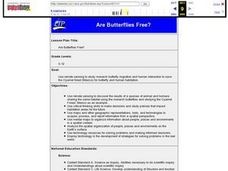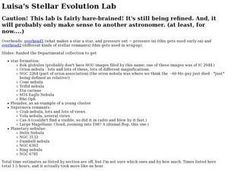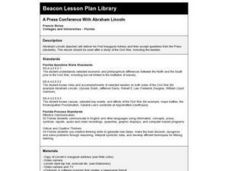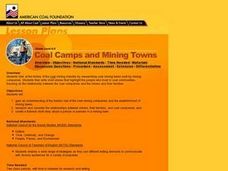Curated OER
Our Five Senses
Students are introduced to the five senses through tasks that require them to use each sense in isolation. Students discover how humans use their senses to learn more about their environment.
Serendip
How Do We Sense the Flavors of Food?
We taste with our taste buds, so why do flavors change when we have a stuffy nose? Scholars experiment with taste testing while holding their noses and then while smelling. They record their observations in pairs and come together to...
Curated OER
Writing About the Zoo Trip
Second graders practice writing. In this five senses writing instructional activity, 2nd graders describe their experience on the field trip they took to the zoo. They work as a class and independently to come up with different things...
Curated OER
Arthur's Eyes
Students learn about the parts of the eye. For this eyes and vision lesson, students the story Arthur's Eyes and create a KWL chart about eyes. Students label the parts of the eye, examine the eyes of different animals to compare them...
Curated OER
Dollars and Sense
Fourth graders read "Starting a Business" and answer the question: "How could you design an ad to let the community know about the business described in the story?" Then, they illustrate a written ad that could be posted in the...
Curated OER
Sound
First graders investigate sound and recognize the importance of hearing. They listen to and identify sounds in the environment, classroom, and on a pre-recorded tape. The students classify each type of sound and participate in a Sound...
Curated OER
Are Butterflies Free?
Learners use remote sensing to study monarch butterfly migration and human interaction to save the Oyamel forest (Mexico) for butterfly and human habitation.
Curated OER
Animal Characteristics
Students investigate the characteristics of animals by creating a chart. In this animal life lesson, students create a KWL chart listing all the different animals a class can name. Students take a field trip to a science facility to get...
Curated OER
Luisa's Steller Evolution Lab
Students examine stars and constellations in the night sky. They complete a KWL chart and calculate the mass of stars. They also discuss how a star is formed.
Curated OER
Using a Thermometer
First graders use their senses to formulate questions and make predictions to determine what is in the "Wonder Bag". They hold pieces of ice and examine while listing descriptors on a chart and then take their own temperature using an...
Curated OER
A Press Conference With Abraham Lincoln
Fifth graders hold a press conference with Abraham Lincoln.
Curated OER
Coal Camps and Mining Towns
Young scholars should gain a better understanding of the processes involved in extracting coal from the Earth as a result of this instructional activity. They reearch the history of coal mining, look into coal mining towns, and create a...
Curated OER
Science Talk about Mammals and Reptiles/Amphibians
Third graders use the internet to research mammals, reptiles and amphibians. They list important items about their chosen animal. Students identify characteristics of an animal and where they live. They classify animals as a mammal,...
Curated OER
"Julie of the Wolves"
Fifth graders research life in Alaska and compare life there to their lives in this instructional activity. They read "Julie of the Wolves." They research through the novel and other reference books facts about the Alaskan climate and...
Curated OER
Balanced Or Unbalanced
Students use physical models and graphs in order to solve problems that have their origin in the real world that require algebraic thinking. The words are changed into equations and inequalities in order to be solved. This requires...
















